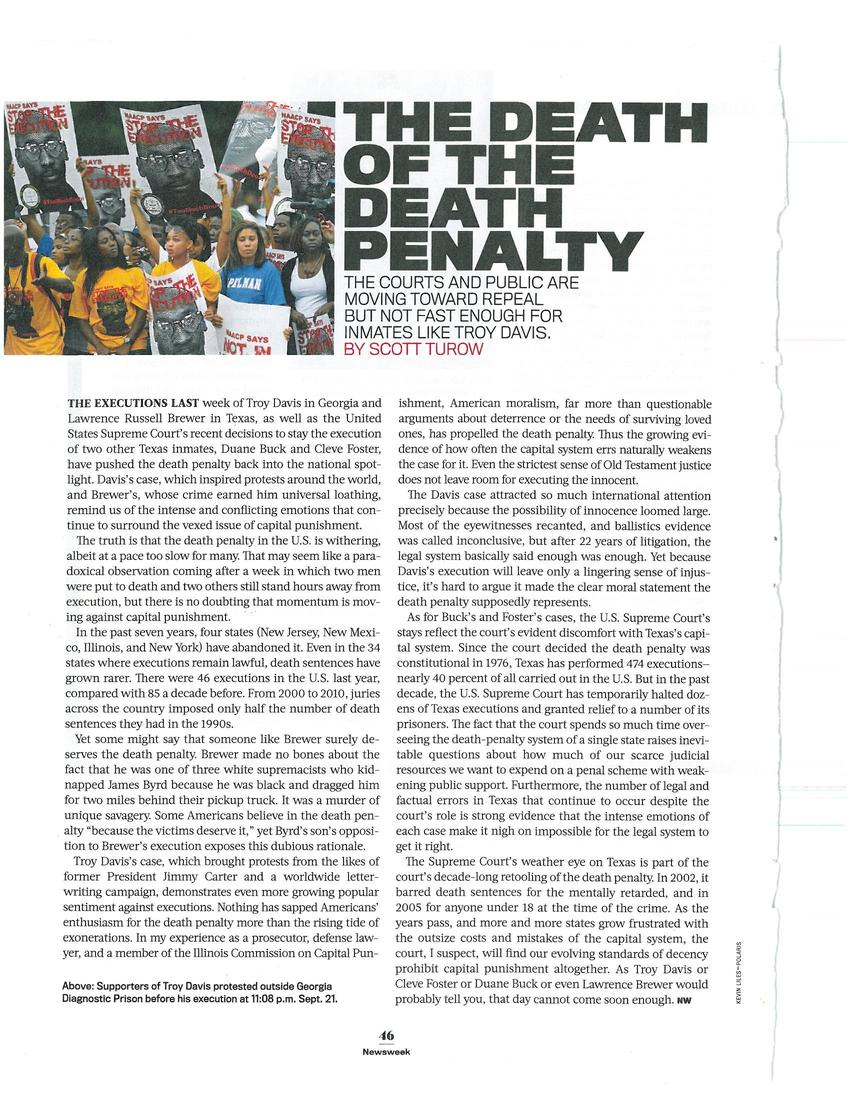
Transcription
[colored photo of assorted protesters against death penalty. Caption at bottom of page: Above: Supporters of Troy Davis protested outside Georgia Diagnostic Prison before his execution at 11:08 p.m., Sept. 21.]
THE DEATH OF THE DEATH PENALTY
The courts and public are
moving toward repeal
but not fast enough for
inmates like Troy Davis.
By Scott Turow
THE EXECUTIONS LAST week of Troy Davis in Georgia and Lawrence Russell Brewer in Texas, as well as the United States Supreme Court’s recent decisions to stay the execution of two other Texas inmates, Duane Buck and Cleve Foster, have pushed the death penalty back into the national spotlight. Davis’s case, which inspired protests around the world, and Brewer’s, whose crime earned him universal loathing, remind us of the intense and conflicting emotions that continue to surround the vexed issue of capital punishment.
The truth is that the death penalty in the U.S. is withering, albeit at a pace too slow for many. That may seem like a paradoxical observation coming after a week in which two men were put to death and two others still stand hours away from execution, but there is no doubting that momentum is moving against capital punishment.
In the past seven years, four states (New Jersey, New Mexico, Illinois, and New York) have abandoned it. Even in the 34 states where executions remain lawful, death sentences have grown rarer. There were 46 executions in the U.S. last year, compared with 85 a decade before. From 2000 to 2010, juries across the country imposed only half the number of death sentences they had in the 1990s.
Yet some might say that someone like Brewer surely deserves the death penalty. Brewer made no bones about the fact that he was one of three white supremacists who kidnapped James Byrd because he was black and dragged him for two miles behind their pickup truck. It was a murder of unique savagery. Some Americans believe in the death penalty “because the victims deserve it,” yet Byrd’s son’s opposition to Brewer’s execution exposes this dubious rationale.
Troy Davis’s case, which brought protests from the likes of former President Jimmy Carter and a worldwide letter-writing campaign, demonstrates even more growing popular sentiment against executions. Nothing has sapped Americans’ enthusiasm for the death penalty more than the rising tide of exonerations. In my experience as a prosecutor, defense lawyer, and a member of the Illinois Commission on Capital Punishment, American moralism, far more than questionable arguments about deterrence or the needs of surviving loved ones, has propelled the death penalty. Thus the growing evidence of how often the capital system errs naturally weakens the case for it. Even the strictest sense of Old Testament justice does not leave room for executing the innocent.
The Davis case attracted so much international attention precisely because the possibility of innocence loomed large. Most of the eyewitnesses recanted, and ballistics evidence was called inconclusive, but after 22 years of litigation, the legal system basically said enough was enough. Yet because Davis’s execution will leave only a lingering sense of injustice, it’s hard to argue it made the clear moral statement the death penalty supposedly represents.
As for Buck’s and Foster’s cases, the U.S. Supreme Court’s stays reflect the court’s evident discomfort with Texas’s capital system. Since the court decided the death penalty was constitutional in 1976, Texas has performed 474 executions—nearly 40 percent of all carried out in the U.S. But in the past decade, the U.S. Supreme Court has temporarily halted dozens of Texas executions and granted relief to a number of its prisoners. The fact that the court spends so much time overseeing the death-penalty system of a single state raises inevitable questions about how much of our scarce judicial resources we want to expend on a penal scheme with weakening public support. Furthermore, the number of legal and factual errors in Texas that continue to occur despite the court’s role is strong evidence that the intense emotions of each case make it nigh on impossible for the legal system to get it right.
The Supreme Court’s weather eye on Texas is part of the court’s decade-long retooling of the death penalty. In 2002, it barred death sentences for the mentally retarded, and in 2005 for anyone under 18 at the time of the crime. As the years pass, and more and more states grow frustrated with the outsize costs and mistakes of the capital system, the court, I suspect, will find our evolving standards of decency prohibit capital punishment altogether. As Troy Davis or Cleve Foster or Duane Buck or even Lawrence Brewer would probably tell you, that day cannot come soon enough.
Newsweek
http://www.newsweek.com/death-death-penalty-67485
Other posts by this author
|
2025 sep 21

|
2025 aug 30

|
2025 aug 2

|
2025 jun 7

|
2025 jun 5

|
2025 jun 3

|
More... |


Replies